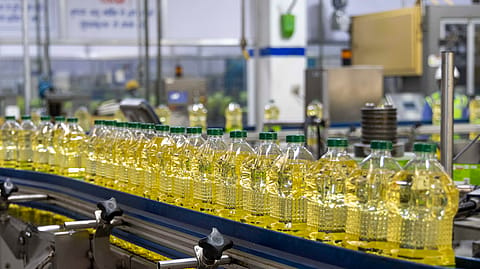Cabinet nod to ₹1-lakh cr agri scheme, ₹10,103 cr edible oil mission
With an expected outlay of ₹10,103 crore, the mission will be implemented from 2024-25 to 2030-31 and aims to increase primary oilseed production to 69.7 million tonnes by 2030-31.

The Centre has approved the restructuring of centrally sponsored schemes for agriculture under the Krishi Vikas and Krishonnati Yojana, with a budget of ₹1.01 lakh crore. The initiative aims to transform agriculture by promoting self-sufficiency and sustainability. Thursday night saw a series of approvals, from an edible oils mission to bonuses and productivity-linked rewards for railway and port employees. Here’s a quick wrap-up of the major announcements.
Krishi Vikas and Krishonnati Yojana
In a rationalisation move for all Centrally Sponsored Schemes (CSS) under the Agriculture Ministry, the cabinet approved two umbrella schemes, the PM Rashtriya Krishi Vikas Yojana (PM-RKVY) and Krishonnati Yojana (KY). PM-RKVY will focus on promoting sustainable agriculture, while KY will address food security and agricultural self-sufficiency. With a total proposed expenditure of ₹1,01,321.61 crore, the central share will amount to ₹69,088.98 crore and the states will contribute ₹32,232.63 crore to these schemes.
The restructured schemes aim to continue existing programs while prioritising areas requiring focused attention, such as the National Mission for Edible Oil-Oil Palm (NMEO-OP), Clean Plant Program, and Digital Agriculture. Additionally, the Mission Organic Value Chain Development for Northeastern Region (MOVCDNER), a component under KY, has been enhanced with a Detailed Project Report (DPR) to address region-specific challenges. PM-RKVY will also offer states greater flexibility in reallocating funds based on local needs.
National Mission on Edible Oils
The Cabinet also approved the National Mission on Edible Oils – Oilseeds (NMEO-Oilseeds). With an expected outlay of ₹10,103 crore, the mission will be implemented from 2024-25 to 2030-31 and aims to increase primary oilseed production to 69.7 million tonnes by 2030-31. The focus crops under the mission would be rapeseed-mustard, groundnut, soybean, sunflower, and sesamum. The mission also targets improving extraction efficiency from secondary sources such as cottonseed, rice bran, and tree-borne oils.
In conjunction with the National Mission on Oil Palm, the goal is to boost domestic edible oil production to 25.45 million tonnes, meeting 72% of the country's projected needs by 2030-31.
Recommended Stories
India, the world's largest edible oil importer, meets over half of its domestic demand through imports. To boost local production, the government launched the National Mission on Edible Oils – Oil Palm (NMEO-OP) in 2021 with an outlay of ₹11,040 crore. In September, the government further raised import duties on edible oils from zero to 20% to protect domestic producers and promote local cultivation.
Phase-2 Chennai Metro approved
The Cabinet yesterday evening also approved the Housing & Urban Affairs ministry’s proposal for Chennai Metro Rail Project Phase-II, which will add three new corridors covering a total of 118.9 km with 128 stations. With an estimated cost of ₹63,246 crore, the project is set to be completed by 2027. Once operational, Chennai's metro network will expand to 173 km.
Boon for port and railway employees
(INR CR)
Ahead of the festive season, the Cabinet also approved a Productivity Linked Bonus (PLB) of ₹2,028.57 crore for 11.72 lakh non-gazetted railway employees, equivalent to 78 days' wages. With a maximum payout of ₹17,951 per employee, beneficiaries include Track Maintainers, Loco Pilots, Train Managers, Station Masters, Supervisors, Technicians, and other Group C staff. The bonus will be paid before Durga Puja/Dussehra. At the Cabinet briefing, IT Minister Ashwini Vaishnaw noted that in 2023-24, Indian Railways hired 1.19 lakh employees, bringing the total workforce to 13.14 lakh by March 2024. The Railways also achieved record freight loading of 1,588 million tonnes and transported 6.7 billion passengers in the last fiscal year.
Further, the cabinet made certain modifications to the Productivity Linked Reward (PLR) Scheme for major port authorities and dock labour board employees, with a total financial impact of ₹200 crore. The changes increase the weightage for port-specific performance from 50% to 55%, rising to 60% by 2025-26, while reducing the all-India performance weightage to 40%. Based on a wage ceiling of ₹7,000 per month, the PLR will be paid annually to the employees. Effective from 2020-21 to 2025-26, the revised scheme will benefit around 20,704 workers.
India to join International Energy Efficiency Hub
The Cabinet has approved India’s membership in the International Energy Efficiency Hub, joining 16 other nations, including the U.S., China, and Germany, in a global effort to reduce greenhouse gas emissions. The Bureau of Energy Efficiency (BEE) will lead India's participation in the initiative. Additionally, the Cabinet granted Classical Language status to five languages: Marathi, Pali, Prakrit, Assamese, and Bengali.